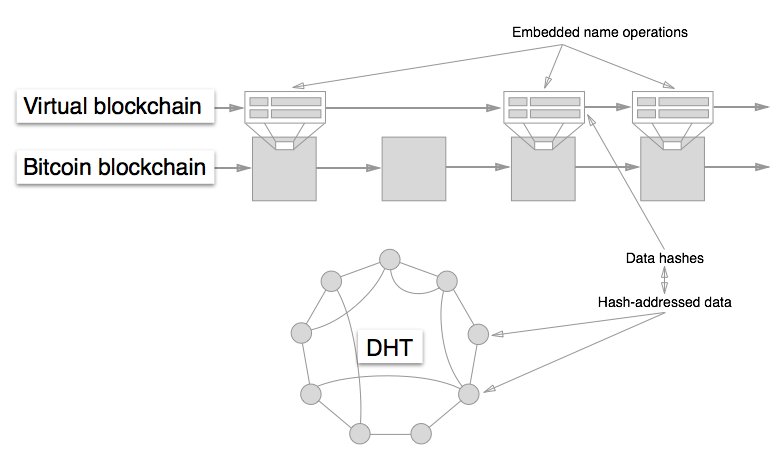by Muneeb Ali @muneeb <[email protected]>, Ryan Shea @ryaneshea <[email protected]>, and Jude Nelson @judecnelson <[email protected]>
Note: This document uses a few sections from a paper that is currently under peer-review. Please contact the authors if you want a copy of the full paper pre-print.
The Domain Name system (DNS) and Public-key infrastructure components like certificate authorities (CAs) are critical components of today's Internet. Security of most online communication and web traffic depends on the security of these systems. Current PKI systems usually require trusting a central party like Verisign and DNS has many security issues e.g., DNS cache poisoning.
Crypotocurrency blockchains are a potential alternative to traditional DNS and PKI systems that can provide better security and decentralization guarantees. The technology is relatively new and evolving rapidly, little production data or experience is available to guide design tradeoffs. In this paper, we summarize our experience with running a large-scale production deployment of a naming system on top of a cryptocurrency (Namecoin), and discuss how our experience informed the design of a new blockchain-based naming and PKI system called Blockstore.
Namecoin provides a blockchain-based key/value store and is originally credited for solving the Zooko's Triangle since it provides a) human-readable names, b) without requiring central or trusted parties, and c) users can securely own the names with their private keys. Namecoin is one of the first forks of Bitcoin and is the oldest cryptocurrency blockchain that is still operational.
The main motivation for starting Namecoin was to create an alternate DNS-like system which uses a blockchain as the primary ledger for storing information on registered domain names, instead of relying on ICANN DNS. Namecoin is derived from Bitcoin code, and keeps most functionality identical to Bitcoin, with the exception of support for registering key/value pairs.
Namecoin supports multiple namespaces, with same rules for pricing and name expiration for all namespaces. By convention, the d/ namespace is used for domain names which are mapped to .bit domain name. For example, to register yahoo.bit, one must register the key d/yahoo and then put the value as the IP address of the Yahoo! website. The key registration process works as follows:
Pre-order: A user first announces the hash(key) without revealing what is it that she is trying to register. This is done by the name_new operation in a new transaction and pre-orders the name.
Reveal: After the name_new transaction has been confirmed by the network i.e., everyone has confirmed that they have seen and accepted the name_new transaction, the user can reveal what was the key she was actually trying to register in a name_firstupdate operation. The user can include the value of the key/value pair in this operation as well.
Update: The value associated with the key can be updated by a name_update transaction. It also happens to renew the key registration by another fixed amount of time (currently 36,000 blocks).
The security of name ownership on a blockchain is tied to the security of both the underlying blockchain and the software powering it. There are three security issues to take into consideration:
- Cost of attack for taking over 51% mining power
- Software vulnerabilities
- Network attacks
For details on these security concerns and other experiences from a large-scale production deployment on Namecoin see this post. Further, the pricing policy for name registrations is very important for enabling a spam-free namespace. See this paper for a detailed discussion of pricing mechanisms and analysis of Namecoin namespaces.
Blockstore enables human-readable name registrations on the Bitcoin blockchain, along with the ability to store associated data in external datastores. You can use it to register globally unique names, associate data with those names, and transfer them between Bitcoin addresses. Anyone can perform lookups on those names and securely obtain the data associated with them.
Blockstore uses the Bitcoin blockchain for storing name operations and data hashes, and a Kademlia-based distributed hash table (DHT) and other external datastores for storing the full data files outside of the blockchain.
Blockstore is designed to implement Namecoin-like functionality in the layer above the blockchain. It leverages the blockchain to achieve consensus on the state of the system at the time of each block discovery, but otherwise offloads its control logic and state to an external process. Critically, Blockstore embeds a virtual blockchain within the blockchain's transactions, which any peer can audit to determine whether or not one Blockstore peer has processed the same name operations as another. In doing so, Blockstore keeps its control plane (the virtual blockchain), its data plane (external storage), and its external storage providers logically separate from one another. We believe this is a significant improvement over alt-coin designs, because it allows the developers of each component to evolve and innovate independently for the benefit of all.
The current reference implementation of Blockstore is in Python and is released as GPLv3 open-source code. In the current implementation users can:
- define namespaces and set parameters for those namespaces
- register names that can be owned by a Bitcoin address
- securely associate hashes of data with names
- store hash-data pairs (key-value pairs) in a DHT or any other storage system
- transfer names from address to address
- renew names so they don't expire
- support SPV-like light clients
In the future, it will support the ability to:
- revoke names (to allow users to recover from name theft)
- reset name ownership (to allow users to recover from either name loss or theft)
- pay name registration fees to miners instead of having them burned (once OP_CHECKLOCKTIMEVERIFY becomes standard)
The easiest way to get started with Blockstore is:
pip install blockstore
There are several other implementations of blockchain-based naming sytems, including BitShares and a few smart contracts on Ethereum.
Existing Ethereum contracts unfortunately do not have the same level of sophistication that Blockstore has, but one could conceivably write more powerful contracts with better designs.
